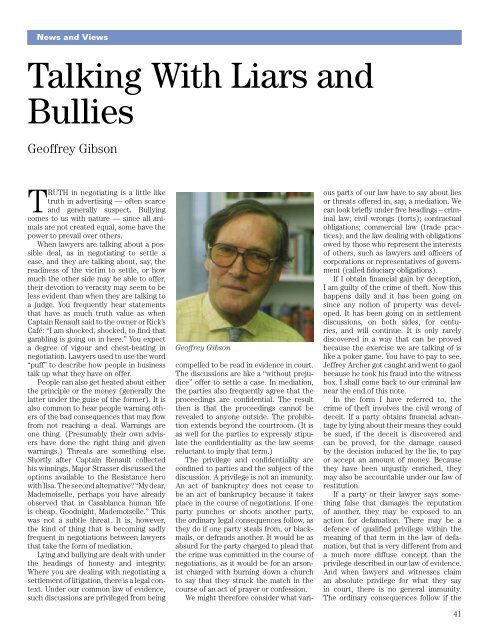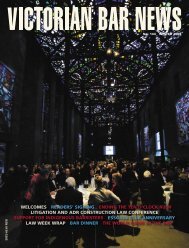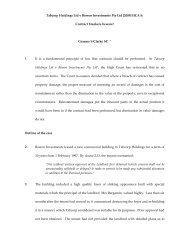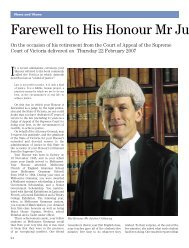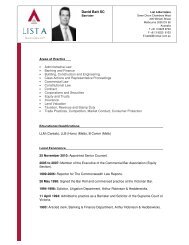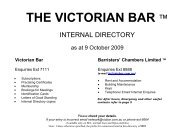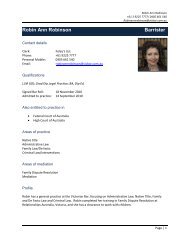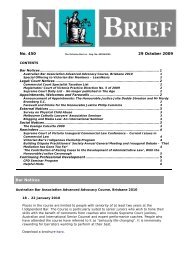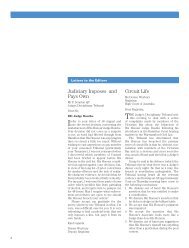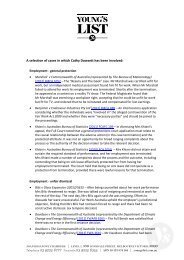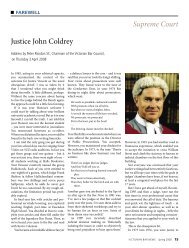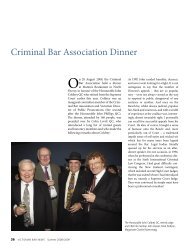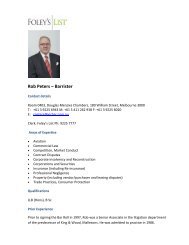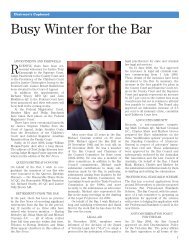5. See M v The Queen (1994) 181 CLR 487at 492; MFA v The Queen (2002) 213 CLR606 at [25].6. See R v Gallagher [1998] 2 VR 671 at 675,where Brooking JA seems to accept thatthe proviso cannot be applied to the firstground. Brooking JA’s judgment contains athorough discussion of the topic.7. Cases decided by the High Court whereit was held that the proviso could not beapplied include: Krakouer v The Queen(1998) 194 CLR 202; 72 ALJR 1229 (misdirectionson the elements of the offenceand burden of proof despite the strengthof the Crown case); Driscoll v The Queen(1977) 137 CLR 517 and Storey v TheQueen (1978) 140 CLR 364 (misdirectionor non-direction on propensity evidence);Farrell v The Queen (1998) 194 CLR286 (failure to admit psychiatric evidencebearing upon the credibility of a criticalwitness); Gilbert v The Queen (2000)201 CLR 414 (conviction for murder wheremanslaughter had not been left to thejury); Grey v The Queen (2001) 75 ALJR1708 (non-disclosure of evidence materiallyaffecting credit of a crucial witness).Cases where the High Court has appliedthe proviso include: Suresh v The Queen(1998) 72 ALJR 769 (evidence of nonrecentcomplaint admitted without objectionin a sex case, where the defence reliedupon it as a prior inconsistent statement);Wilde v The Queen (1988) 164 CLR 365(failure to sever an indictment where,however, the Crown case was extremelystrong and the defence extremely weak);Festa v The Queen (2001) 208 CLR 593;76 ALJR 291 (misdirection concerningidentification evidence).8. See R v Gallagher [1998] 2 VR 671; Grey vThe Queen (2001) 75 ALJR 1708; 184 ALR593 at [25], [52]–[56]; Festa v The Queen(2001) 208 CLR 593; 76 ALJR 291 at [110]–[123], [197]–[199], [222]–[228]; Conway vThe Queen (2002) 209 CLR 203; 76 ALJR358; Ugle v The Queen (2001) 211 CLR171; 76 ALJR 886; TKWJ v The Queen(2002) 212 CLR 124.9. R v Weiss (2004) 8 VR 388; 145 A Crim R478 at [70].10. (2005) 80 ALJR 444; 223 ALR 662; [2005]HCA 81 at [10].11. Following Crease v <strong>Bar</strong>rett (1835) 1Cr M & R 919 at 933 [149 ER 1353 at1359] the rule was taken to mean thatcourts had renounced all discretion, and,“where evidence formally objected toat Nisi Prius is received by the Judge,and is afterwards thought by the Courtto be inadmissible, the losing party hasa right to a new trial” — Wright v Doedem Tatham (1837) 7 A & E 313 at40330 [112 ER 488 at 495] per Lord DenmanCJ.12. R v Gibson (1887) 18 QBD 537 at 540–541per Lord Coleridge CJ. Compare R v Grills(1910) 11 CLR 400 at 410 per Griffiths CJ.13. Weiss at [18].14. Weiss at [18].15. Weiss at [30].16. Weiss at [40].17. Weiss at [41].18. See fn 5 above.19. R v Arcangioli [1994] 1 SCR 129 at 146.20. Colpitts v The Queen [1965] SCR 739 at744.21. At [6].22. At [113].23. Section 385(1) of the Crimes Act 1961(NZ) relevantly provides:(1) On any appeal ... [the Court] mustallow the appeal if it is of opinion:(a) That the verdict of the juryshould be set aside on theground that it is unreasonableor cannot be supported havingregard to the evidence; or(b) That the judgment of the Courtbefore which the appellant wasconvicted should be set asideon the ground of a wrong decisionon any question of law; or(c) That on any ground there was amiscarriage of justice; or(d) That the trial was a nullity —and in any other case shall dismissthe appeal:Provided that [the Court] may,notwithstanding that it is ofopinion that the point raised inthe appeal might be decided infavour of the appellant, dismissthe appeal if it considers thatno substantial miscarriage ofjustice has actually occurred.24. At 701–2.25. At 711–12.26. In particular, at [36] Lord Carswell said ofobservations in Wilde v The Queen (1988)164 CLR 365 at 372, 373, 374, per Brennan,Dawson and Toohey JJ. — “Their Lordshipsagree with these statements of thelaw and consider that they are correct.”27. R v Howse [2006] 1 NZLR 433; [2005]UKPC 31 at [34]–[35].28. See also The Queen v Wilson [2006] NZCA150.29. At [60].30. In a case concerning whether manslaughtershould have been left to the jury ona charge of murder, the Court of Appeal(Vic.) in R v Gill (2005) 159 A Crim R 243at [28], in commenting on the High Court’sjudgment in Weiss at [43], said:With respect, we regard those propositionsas giving rise to some internaltensions, given that, for the purpose ofassessing the application of the proviso,the appellate court must put aside thejury’s verdict, while at the same timebearing in mind that the jury returneda guilty verdict; must bear in mind thatthe issues in a trial are shaped by theforensic decisions of counsel, while atthe same time also bearing in mind thatunder the rule in Gillard [Gillard vThe Queen (2003) 219 CLR 1] forensicdecisions of counsel are to be ignored;and, subject to the modifications mentioned,must endeavour to decide thecase itself, as would occur in an appealin a civil matter, but with the differencethat, if in the end the appellate court isnot satisfied beyond reasonable doubtthat the evidence below establishedthat the accused was guilty of theoffence charged, the court must ordinarilyorder that a new trial be had.31. Nudd at [6] per Gleeson CJ; at [158]–[159]per Callinan and Heydon JJ.32. Nudd at [2] (fn 2), [6].33. Nudd at [57] (fn 83), [87] (fn 126), [112](fn 153).34. Gleeson CJ, Gummow, Heydon and CrennanJJ.35. At [84], citing Weiss v The Queen (2005)80 ALJR 444 at 454–455, [41] per GleesonCJ, Gummow, Kirby, Hayne, Callinan andHeydon JJ; 223 ALR 662 at 673–674.36. See and compare the judgment of themajority at [96].37. R v Redmond & Anor [2006] VSCA 75at [23]. Lies were wrongly left as to consciousnessof guilt. The proviso was notapplied.38. See fn 28 above.39. R v Nguyen [2006] VSCA 158.40. Keller v R [2006] NSWCCA 204.41. Gardiner v R (2006) 162 A Crim R 233(NSW, CCA).42. R v VA S [2006] VSCA 159 at [32]–[33].43. R v Hackett [2006] VSCA 138.44. W v R (2006) 162 A Crim R 264 (Tas,CCA).45. Livermore v R [2006] NSWCCA 334.46. Oldfield v R [2006] NSWCCA 219.47. Taleb v R [2006] NSWCCA 119.48. Robinson v R (2006) 162 A Crim R 88(NSW, CCA).49. Section 80 of the Constitution provides (sofar as is relevant):The trial on indictment of any offenceagainst any law of the Commonwealthshall be by jury ...50. His last conviction appeal was R v LRG[2006] VSCA 288 (see at [35]).51. [2006] VSCA 277.52. At [5].
News and ViewsTalking With Liars andBulliesGeoffrey GibsonTRUTH in negotiating is a little liketruth in advertising — often scarceand generally suspect. Bullyingcomes to us with nature — since all animalsare not created equal, some have thepower to prevail over others.When lawyers are talking about a possibledeal, as in negotiating to settle acase, and they are talking about, say, thereadiness of the victim to settle, or howmuch the other side may be able to offer,their devotion to veracity may seem to beless evident than when they are talking toa judge. You frequently hear statementsthat have as much truth value as whenCaptain Renault said to the owner or Rick’sCafé: “I am shocked, shocked, to find thatgambling is going on in here.” You expecta degree of vigour and chest-beating innegotiation. Lawyers used to use the word“puff” to describe how people in businesstalk up what they have on offer.People can also get heated about eitherthe principle or the money (generally thelatter under the guise of the former). It isalso common to hear people warning othersof the bad consequences that may flowfrom not reaching a deal. Warnings areone thing. (Presumably their own advisershave done the right thing and givenwarnings.) Threats are something else.Shortly after Captain Renault collectedhis winnings, Major Strasser discussed theoptions available to the Resistance herowith Ilsa. The second alternative? “My dear,Mademoiselle, perhaps you have alreadyobserved that in Casablanca human lifeis cheap. Goodnight, Mademoiselle.” Thiswas not a subtle threat. It is, however,the kind of thing that is becoming sadlyfrequent in negotiations between lawyersthat take the form of mediation.Lying and bullying are dealt with underthe headings of honesty and integrity.Where you are dealing with negotiating asettlement of litigation, there is a legal context.Under our common law of evidence,such discussions are privileged from beingGeoffrey Gibsoncompelled to be read in evidence in court.The discussions are like a “without prejudice”offer to settle a case. In mediation,the parties also frequently agree that theproceedings are confidential. The resultthen is that the proceedings cannot berevealed to anyone outside. The prohibitionextends beyond the courtroom. (It isas well for the parties to expressly stipulatethe confidentiality as the law seemsreluctant to imply that term.)The privilege and confidentiality areconfined to parties and the subject of thediscussion. A privilege is not an immunity.An act of bankruptcy does not cease tobe an act of bankruptcy because it takesplace in the course of negotiations. If oneparty punches or shoots another party,the ordinary legal consequences follow, asthey do if one party steals from, or blackmails,or defrauds another. It would be asabsurd for the party charged to plead thatthe crime was committed in the course ofnegotiations, as it would be for an arsonistcharged with burning down a churchto say that they struck the match in thecourse of an act of prayer or confession.We might therefore consider what variousparts of our law have to say about liesor threats offered in, say, a mediation. Wecan look briefly under five headings – criminallaw; civil wrongs (torts); contractualobligations; commercial law (trade practices);and the law dealing with obligationsowed by those who represent the interestsof others, such as lawyers and officers ofcorporations or representatives of government(called fiduciary obligations).If I obtain financial gain by deception,I am guilty of the crime of theft. Now thishappens daily and it has been going onsince any notion of property was developed.It has been going on in settlementdiscussions, on both sides, for centuries,and will continue. It is only rarelydiscovered in a way that can be provedbecause the exercise we are talking of islike a poker game. You have to pay to see.Jeffrey Archer got caught and went to gaolbecause he took his fraud into the witnessbox. I shall come back to our criminal lawnear the end of this note.In the form I have referred to, thecrime of theft involves the civil wrong ofdeceit. If a party obtains financial advantageby lying about their means they couldbe sued, if the deceit is discovered andcan be proved, for the damage causedby the decision induced by the lie, to payor accept an amount of money. Becausethey have been unjustly enriched, theymay also be accountable under our law ofrestitution.If a party or their lawyer says somethingfalse that damages the reputationof another, they may be exposed to anaction for defamation. There may be adefence of qualified privilege within themeaning of that term in the law of defamation,but that is very different from anda much more diffuse concept than theprivilege described in our law of evidence.And when lawyers and witnesses claiman absolute privilege for what they sayin court, there is no general immunity.The ordinary consequences follow if the41


